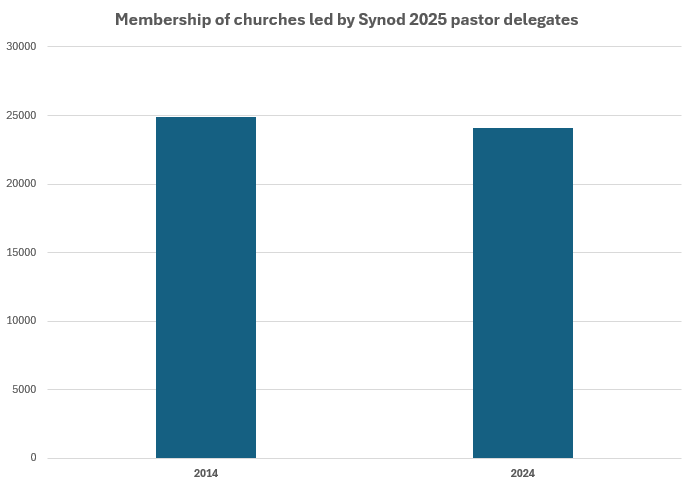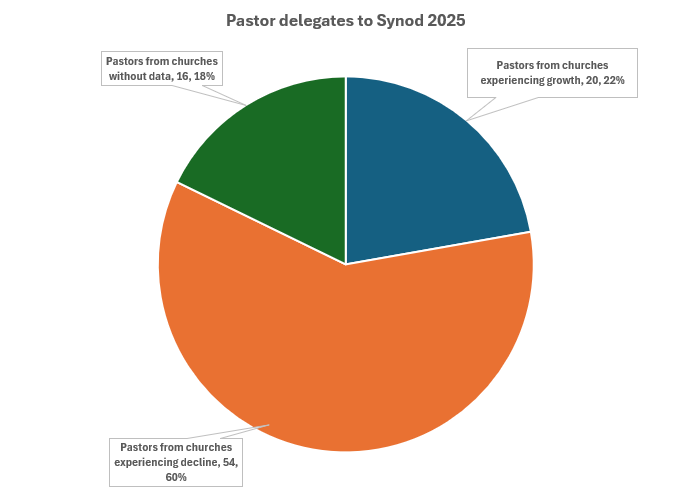Are pastor delegates to Synod 2025 coming from declining churches?
Yes, but it's not worse than the CRC-wide average.
Is it really possible to be both an effective local pastor and a strong denominational leader?
I’ve long held an assumption that CRC pastors who care a great deal about ministry in their local congregation tend not to be involved in classical or denominational matters. They participate less at classis meetings and are less likely to be delegated to synod. They are also less likely to participate in denominational matters in the form of serving on boards.
Likewise, those who participate in denominational matters are less adept at ministry in their local congregations. These are the pastors who like board meetings more than funerals and who like speaking on the floor of Synod more than from behind the pulpit.
Underlying this is a deeper assumption: the skills necessary for excelling at institutional matters tend to be different from the skills necessary for excelling in local ministry. You can sit on a denominational board or sit beside a hospital bed; you can write a good overture or write a good sermon. You can’t do both well.
I’m not the only one who thinks this.
Before one of the previous three Synods—I can’t remember which one—I was talking with a few fellow CRC pastor-friends. The question came up about how the pastor of a now-disaffiliated congregation everyone knows about felt about an overture everyone’s heard about. What did this pastor think? Our group consensus was that this particular pastor probably didn’t care, because this pastor’s energy was directed at the needs of the local congregation and not directed at what was necessary to participate in denominational matters and the internet chatter surrounding it. There was too much work to do in the local church.
The assumption, then, is that it’s possible to be a great pastor in a local congregation or it’s possible to be an effective leader in the denomination—involved in classis, synod, and board on the one hand, and writing and commenting at length on denominational matters on the other hand—but not both.
This assumption is wrong. Mostly.
Membership decline among churches of pastors delegated to Synod 2025
Much of the work of pastoral ministry cannot be measured, but some of it can, and of the things that can, church membership trends rank among the most important.
If it’s true that CRC pastors who tend to go to Synod are better suited toward the work of denominational matters than the work of local congregational ministry, then we should see it in the form of different rates of membership decline. Specifically, churches with denominationally-oriented pastors should experience more decline than congregation-oriented pastors, because churches with denominationally-oriented pastors are too busy doing other things.
Let’s compare.
In the ten-year period between 2014 and 2024, the CRC lost 22.6% of its members.
By comparison, the churches led by pastor delegates to Synod 2025 lost only 2.8% of their total members during the same period.
Of churches led by pastor delegates to Synod 2025:
There were 24,784 members in 2014
There were 24,085 members in 2024
In other words, the churches pastored by delegates to Synod 2025 are declining more slowly than the rest of the denomination.
Of the 90 pastors delegated to Synod 2025:
20 come from churches experiencing growth
54 come from churches experiencing decline
16 come from churches without 2014 data for one of four reasons: because they were non-existent or emerging, because they had a name change (and I couldn’t find the previous name), because they hadn’t reported any membership data for several years prior to 2014 (so the 2014 is likely inaccurate), or because the 2025 pastor delegate was not pastor of the church but served in another role, for example, as a chaplain.
The median rate of membership decline among churches whose pastors are delegated to Synod 2025 is 15.3%. Or, to put this differently, half of all pastor delegates to Synod come from churches who have lost more than 15.3% of their members, and the other half from churches who have lost less than 15.3% of their members.
The 2 outlier churches: Sunlight Church and All Nations Church
There are two pastor delegates to Synod 2025 from churches that have experienced massive growth in the period from 2014 to 2024.
Sunlight Church in Port St. Lucie, Florida, pastored by delegate Scott VanderPloeg, is one of the largest and fastest-growing churches in the denomination, which grew from 452 members in 2014 to 1309 members in 2024.
All Nations Church in Lake View Terrace, the largest church in the denomination, which grew from 41 members in 2014 to 2190 members in 2024.
Excluding these two churches, the churches pastored by delegates to Synod 2025 lost 15.3% of their total members.
Of these churches led by pastor delegates to Synod 2025:
There were 24,291 members in 2014
There were 20,586 members in 2024
This represents a 15.3% decline. That’s a lot worse than the 2.8% decline when those two churches are included, but it’s still also better than the 22.6% CRC-wide decline.
Still, it’s worth asking: should we be delegating pastors to Synod whose churches have lost 15.3% of their membership in the past ten years? Even if it’s better than the 22.6% CRC-wide decline, it’s still not a great number, especially because the need to reverse membership decline has become a recurring topic at Synod in recent years.
3 final thoughts
Pastors delegated to Synod 2025 seem to be the kind of people with an above average interest in classical and denominational affairs and tend to be pastoring churches that are doing better than average. These pastors seem to be, on average, the right people to be having the conversation about membership decline.
The line between denominational work and local church work isn’t distinct. The skills required to do Boring Institutional Stuff and the skills required to do Important Pastoral Stuff seem to have some overlap. There’s not a neat separation between the two.
The Boring Institutional Stuff is pastoral. The slow, grinding gears of the institution are turned by the Spirit in their own way.
4 ways I could be wrong about this
It’s difficult to measure the health of a congregation and the effectiveness of pastoral ministry. Numbers tell a story, but they don’t tell the whole story.
I’m inferring a great deal from a small subset of pastors and not looking at multi-year trends. How does this stack up against delegates to Synod 2022 and Synod 2023, for example? Is there a larger trend? Is Synod 2024 an exception—i.e. perhaps the work of Synod 2022, 2023, and 2024 was done by pastors from declining churches who are tired and sitting out for Synod 2025?
The above analysis assumes pastoral ministry is a binary, either-or work: either denominational work or local ministry. Though I think it’s an important binary, it doesn’t represent all of what it means to be a pastor.
The above analysis assumes that pastoral leadership is the main factor that determines whether a church grows or shrinks. In many cases, it’s either not the main factor, or it’s related to other factors in complex ways.
Thanks for reading,
Kent
P.S. Sign up to get the next post:







This was an interesting question to ask. I do think you might assume that leaders can pay attention to the local or the institutional, but I think someone who is good at guiding a diverse community on a collective mission is also someone who might be able to help a diverse institution work through a collective mission.
As I was reading I thought "there has to be another way to measure the effectiveness of a pastor" especially because numbers in the present day are often a reflection of broader trends of a declining church rather than an indictment on a particular leader. I think membership numbers might be the only thing that we can measure though, so I appreciate seeing some of that laid out.
Another great analysis, Kent, thanks for this. One other mediating factor is that delegation practices vary from classis to classis. In my classis for example, one pastor delegate is elected and the other is on a multi-year rotating list. In that sense some of the delegates this year are not so much a response to the last few Synods as they are the "luck of the draw" (hand of providence? We'll see)